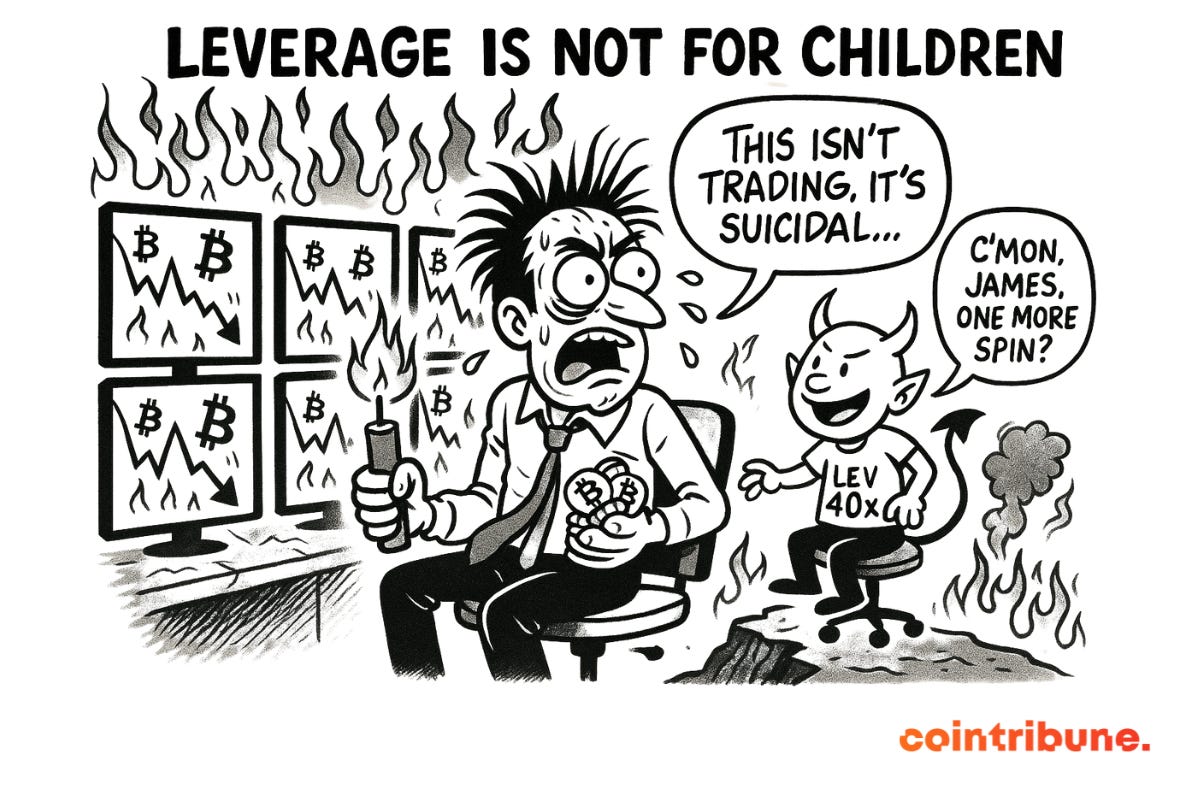Hello Cointribe! 🚀
Today is Friday, June 6, 2025, and like every day from Tuesday to Saturday, we summarize for you the news from the last 24 hours that you could not miss!
But first…
✍️ Cartoon of the day:
A quick look at the market…
🌡️ Temperature:
⛈️ Stormy
24h crypto recap! ⏱
🏦 JPMorgan accepts cryptocurrencies as collateral for loans
JPMorgan announced that its clients will now be able to use their cryptocurrency assets as collateral to obtain loans. This decision notably concerns products such as Bitcoin ETFs, including BlackRock's iShares Bitcoin Trust. Cryptocurrencies will also be taken into account in the calculation of the liquid assets of wealth management clients.
💰 Classover commits 500 million dollars to build a strategic reserve in Solana
Classover company has invested up to 500 million dollars via convertible bonds to establish a strategic reserve in Solana (SOL). This initiative is accompanied by a second $400 million equity program, bringing the total leverage to $900 million. The first acquisition involved 6,472 SOL tokens, valued at $1.05 million. Following this announcement, Classover's stock jumped 46.5% on the Nasdaq.
📈 Circle exceeds expectations with a $1.1 billion raise on Wall Street
Circle raised $1.1 billion during its IPO, surpassing the initially expected $896 million. The company's valuation now reaches $6.9 billion, with a fully diluted value of $8.1 billion. Shares sold at $31, above the $27-28 range. The USDC stablecoin issued by Circle maintains its position as the world’s second largest stablecoin with a market capitalization of $60.9 billion.
⚠️ James Wynn loses $25 million in new Bitcoin liquidation with leverage
Trader James Wynn, known by the pseudonym "moonpig," suffered a loss of $25 million on a Bitcoin position with 40x leverage. Despite repeated losses, he maintains an open position of $82 million. This situation highlights the risks associated with speculative high-leverage trading in the cryptocurrency world.
⚡ The White House breaks ties with Elon Musk
On June 5, 2025, a public confrontation erupted between Donald Trump and Elon Musk, ending a political and economic alliance that had marked the 2024 presidential campaign. This break occurred after Musk criticized the budget bill proposed by Trump, calling it a "repugnant abomination" on platform X (formerly Twitter). In response, during an official reception at the Oval Office in the presence of German Chancellor Friedrich Merz, Trump expressed his disappointment with Musk, stating he knew the content of the law better than anyone.
The quarrel quickly took on an economic dimension. Trump threatened to cancel federal contracts related to Tesla and SpaceX, jeopardizing commercial relations between the government and Musk's companies. In reaction, SpaceX announced the immediate halt of the Dragon spacecraft, used by NASA.
Crypto of the day: Immutable (IMX)
🧠 Technology and Innovation
Immutable is a layer 2 solution built on Ethereum, specially designed for games and NFTs. It uses ZK (Zero-Knowledge) rollup technology to offer fast, secure transactions without gas fees for users.
The platform allows developers to create decentralized games and NFT applications with a smooth user experience. Notable projects built on Immutable include popular games such as Gods Unchained and Illuvium.
💰 IMX Token – Utility and Distribution
The IMX is the native token of the Immutable network. It is used for:
Transaction fees: payment for operations on the platform.
Staking: holders can lock their IMX to earn rewards.
Governance: participation in decisions regarding protocol evolution.
The initial distribution of IMX was carried out via private and public sales, with particular attention to community engagement and developer support.
📊 Market data (as of June 6, 2025)
Current price: $0.5038 USD
24-hour change: -$0.0416 (-7.62%)
Market capitalization: approximately $928 million
Rank on CoinMarketCap: #74
Circulating supply: 1,841,869,206 IMX
24-hour trading volume: approximately $38 million
Czech Republic: A Bitcoin donation of criminal origin precipitates the fall of the Minister of Justice
A political earthquake shakes Prague. The Czech Minister of Justice, Pavel Blažek, resigned after the revelation of a Bitcoin donation of criminal origin accepted by his ministry. The source of the funds — linked to a former drug trafficker — and the absence of prior verification triggered a crisis of trust, reviving the debate on integrating cryptocurrencies into institutional channels.
An explosive donation of 468 BTC, sold without verification
It all began in March 2025, when the Czech Ministry of Justice accepted an atypical donation: 468 bitcoins, about $45 million at current prices. This donation was then converted into Czech crowns via an auction to finance projects for modernizing the judicial and penitentiary system.
But quickly, the press discovered the origin of the funds: they come from Tomáš Jiřikovský, sentenced in 2017 for drug trafficking and massive fraud. The man, now incarcerated, reportedly voluntarily returned his bitcoins to the state as a form of moral reparation.
Under pressure, Pavel Blažek admitted he had conducted no verification of the origin of the funds, justifying his position by the time elapsed since the conviction. "I was not interested, so many years after the case," he declared in a press conference. A statement that accelerated his political downfall.
Political crisis, public mistrust, and regulatory void
The controversy quickly went beyond the ministry concerned. The political opposition, led by the ANO party, called for a vote of no confidence against the government, citing a serious breach of ethics and transparency. Five months before elections, the ruling coalition’s credibility is weakened.
Beyond the political crisis, this case reveals the flaws of the legal framework surrounding cryptocurrency donations in the public sphere. Neither traceability mechanism nor standardized procedure was apparently applied in this specific case. The Czech scandal illustrates the urgent need for robust regulations, both nationally and at the European level, to prevent cryptocurrencies from becoming tools of money laundering or illicit influence.
The "Bitcoins of Shame" case in the Czech Republic raises fundamental questions about the compatibility between digital assets and public governance. While cryptocurrencies can serve causes of general interest, their management without a precise framework exposes institutions to major risks: reputational, political, and legal. The Czech case could thus set a precedent… and accelerate an awaited reform in Brussels on the transparency of crypto flows within member states.









